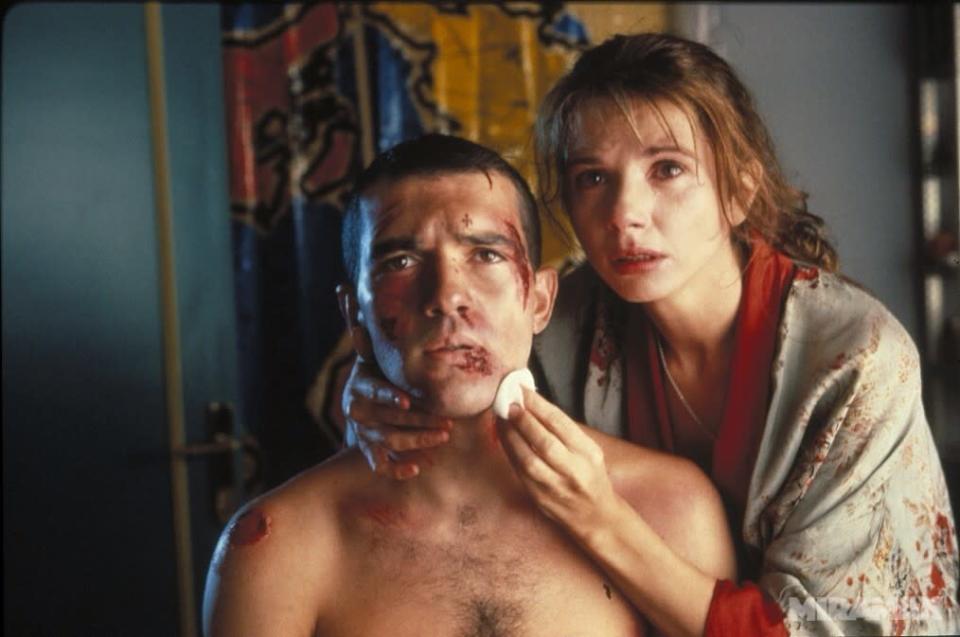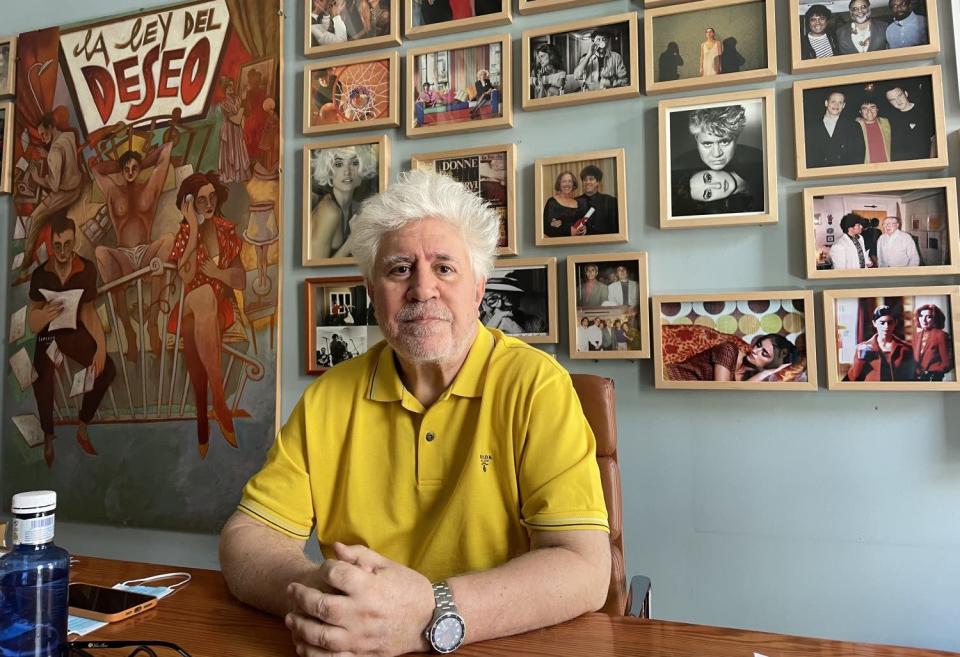
Pedro Almodóvar has spent decades avoiding the allure of American studio projects, from “Sister Act” to “Brokeback Mountain,” and still doesn’t trust the system. “It’s kind of a contradiction,” he told IndieWire during a recent afternoon in his office in Madrid. “Hollywood wants to bring in outside talent, but they don’t always let them do what they want to do.”
These days, Almodóvar has addressed that conundrum by making the talent come to him. Continuing his toe-dip into English language filmmaking that started with his Tilda Swinton-starring short film “The Human Voice” in 2020, the 72-year-old director is on the verge of taking another step.
More from IndieWire
“Strange Way of Life,” which begins production in late August, will star Ethan Hawke and Pedro Pascal as a pair of middle-aged gunslingers at the center of a 30-minute Western. Much of the action will take place in the desert region of Spain’s Almería region, where Sergio Leone famously shot “The Good, the Bad, and the Ugly,” though Almodovár was not thinking of the story as a throwback to Spaghetti Westerns. “I’m not consciously referencing those movies,” he said. “I don’t know what it will be like, except that it will be mine.”
Almodóvar has maintained autonomy on his projects over the years by producing them with his in-house production company El Deseo, a team that includes his brother, producer Agustín. For “Strange Way of Life,” he has gained another partner-in-crime with Saint Laurent, whose head designer Anthony Vaccarello will serve as an associate producer on the project as well as the costume designer. Saint Laurent has supported several recent short films and features from major filmmakers, including Gaspar Noé’s “Lux Aeterna,” which recently opened in the U.S. “It’s very convenient for me,” Almodóvar said. “I feel much freer to do things in English this way.”
He held an initial rehearsal for the project over Zoom at the start of the summer. “It was an awful way to rehearse,” he said, “but they were working.” Now that Pascal has wrapped on production on HBO’s “The Last of Us” and Hawke has finished promotional duties for “The Black Phone,” the two were expected to convene in Spain in early July for further preparations, including the Saint Laurent costumes. The title of the short stems from the name of a Portuguese fado song by Amalia Rodrgues, which Almodóvar said will open the movie. “Those songs are all very sad,” he said. “And that is how these two main characters live.”
The short provides Almodóvar with another English-language experiment ahead of “A Manual for Cleaning Women,” the adaptation of Lucía Berlin short stories he still plans to direct with Cate Blanchett attached to star. Production is currently expected to begin next year, but it’s been a long time coming: He finished up the script along with two others during the first pandemic lockdown, but said that “Strange Way of Life” was his current priority. “Right now, we are concentrated on the Western,” he said. “I know how I want to make it, but I will discover more things while shooting.”
This is not the first time Almodóvar has flirted with the genre. The opportunity to direct “Brokeback Mountain” came up prior to Ang Lee’s involvement in the 2005 Oscar winner. “I think Ang Lee made a wonderful movie, but I never believed that they would give me complete freedom and independence to make what I wanted,” Almodóvar said. “Nobody told me that — they said, ‘You can do whatever you want,’ but I knew that there was a limitation.”
The script, which Larry McMurtry and Diana Ossana adapted from Annie Proulx’s short story, lacked the degree of lust that Almodóvar envisioned for the two cowboy characters, ultimately played by Heath Ledger and Jake Gyllenhaal. “The relation between these two guys is animalistic,” Almodóvar said. “It was a physical relationship. The punch of the movie comes when they have to separate, and Heath Ledger discovers that he can’t think about leaving. That’s a strong discovery. But until that moment, it is animalistic, and for me it was impossible to have that in the movie because it was a Hollywood movie. You could not have these two guys fucking all the time.”
In light of that history, Almodóvar said, “Strange Way of Life” provided a new opportunity for a Western two-hander. “It could be like my answer to ‘Brokeback Mountain,’” he said.
He was reticent to reveal too many details about the storyline, but said that Hawke plays a sheriff named Jake, while Pascal will be the gunslinger Silva, and the characters live on opposing sides of the desert. The pair haven’t seen each other in 25 years. “So one of them travels through the desert to find the other,” Almodóvar said. “There will be a showdown between them, but really the story is very intimate.” Could it even be…romantic? Almodóvar chuckled. “You can guess,” he said. “I mean, masculinity is one of the subjects of the movie.”
When Almodóvar talks about filmmaking from his office at El Deseo, he sits at the center of his legacy. A vast collage of photographs adorns the wall behind his desk and tell the story of his career. There are a slew of images featuring the young director hanging with likeminded creators: Photographs with John Waters, Frances Ford Coppola, Spike Lee, and choreographer Pina Bausch were all visible, along with one from a meeting with Billy Wilder in the 1980s. At the time, Almodóvar was riding high from the international acclaim for “Women on the Verge of a Nervous Breakdown,” and the studio veteran advised him to keep his distance from Hollywood.
“He was right,” Almodóvar said. “I always refused this idea. First of all, I don’t know the culture as much as I know Spanish culture. But also, the way of shooting is very different from what I used to do.” He kept close tabs on other international directors who have made inroads with English-language projects. “We have some exceptions, like Yorgos Lanthimos or the Mexican friends” — that would be the Three Amigos of Alfonso Cuarón, Alejandro Gonzalez Iñarritu, and Guillermo del Toro — “but for everyone else, it was very bad for them to go to Hollywood,” he said. “Even for directors like John Woo. His kind of action-thriller is perfect for Hollywood, but even he didn’t survive it.”
A few years ago, El Deseo produced the dark Argentine comedy “Wild Tales,” which established filmmaker Damian Szifrón as a major director and secured him opportunities to develop studio projects, including a remake of “The Six Billion Dollar Man.” The project fell apart after three years of development. “That example is very typical,” Almodóvar said. He was puzzled by the successes that Iñarritu found with “Birdman” and “The Revenant,” both of which won him Best Director Oscars. “His movies are very dark and not typical Hollywood,” Almodóvar said. “I don’t know how he found out the way to survive in Hollywood making his own movies. It’s very strange.”


Almodóvar said he first detected challenges for his work in the U.S. when his 1989 romp “Tie Me Up! Tie Me Down!” opened there and faced pressure from the MPAA to cut some of the sexuality from the movie to avoid an X rating. “It was the first time I tried to defend something that was obvious to me, which is the freedom of the director,” he said. “And then I discovered that was not part of the rules there.” Miramax, which was distributing the movie, sued the MPAA and lost; the film was released unrated. “I discovered that Miramax was very happy with the situation because for them it was like publicity,” Almodóvar said. “I felt very bad because of that.”
The plot, in which a character played by Antonio Banderas kidnaps an actress in an attempt to seduce her, led to some awkward interviews as well. “A journalist for ABC asked me if I was afraid that some guys are going to imitate Antonio Banderas and start kidnapping girls,” he said. “I remember my answer. I said that if I knew that the only distribution of my movies was in prison and inside psych wards, then I’d be careful about the stories I’m telling. But I don’t think the audience is crazy.”
Despite these misgivings, he seemed confident about completing his advancement towards an English language feature with “A Manual for Cleaning Women” in the foreseeable future. The project, which starts in the ’60s and culminates in the ’90s, spoke to his sensibilities. “We’re going to make this movie,” he said. “The way the main character behaves is very close to my heroines. So that’s why I decided to do it. I don’t know about American society, the small details of everyday life. That’s why I said no to the rest.”
However that undertaking came together, though, Almodóvar was adamant that it would be made with the same resources that have allowed him to maintain his vision over the years. “In the U.S., there are many people with power you have to listen to,” he said. “But here in Spain, I don’t listen to anyone.” He stopped himself. “I mean, I listen to my brother,” he said, “but I can be independent.”
Best of IndieWire
Sign up for Indiewire’s Newsletter. For the latest news, follow us on Facebook, Twitter, and Instagram.



